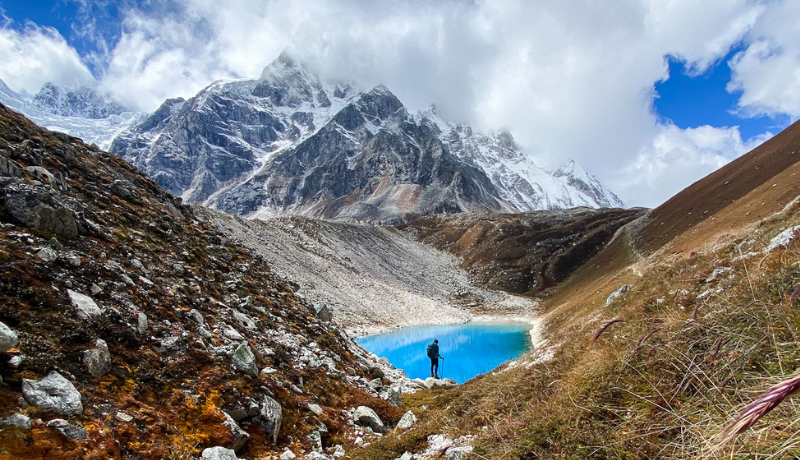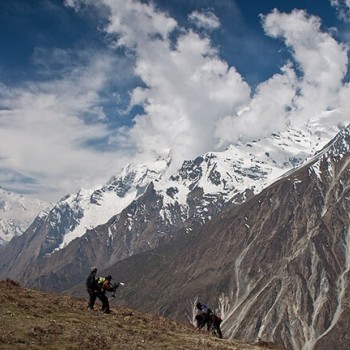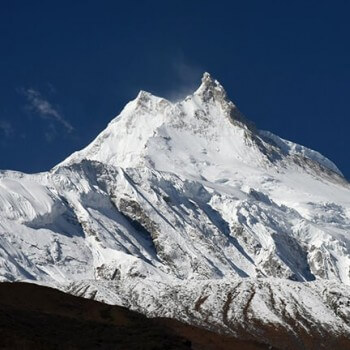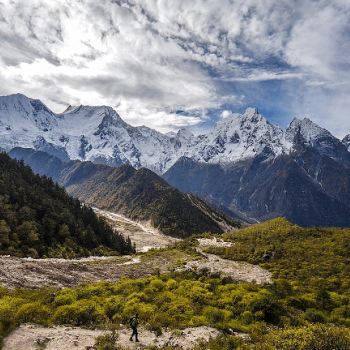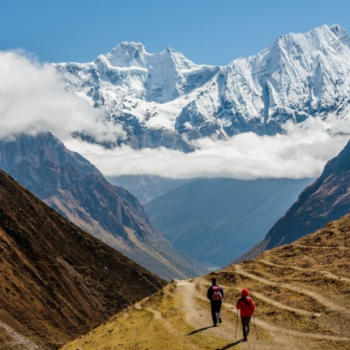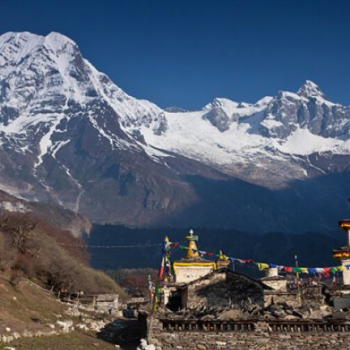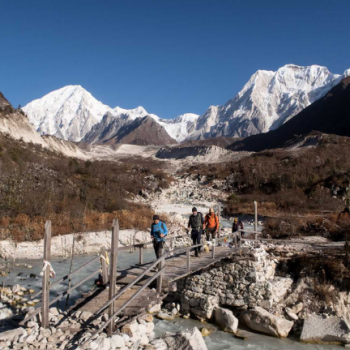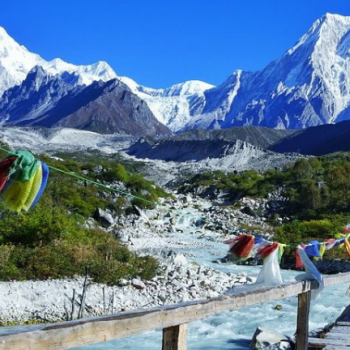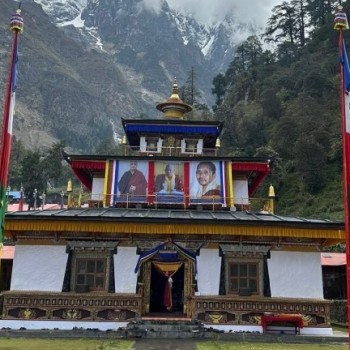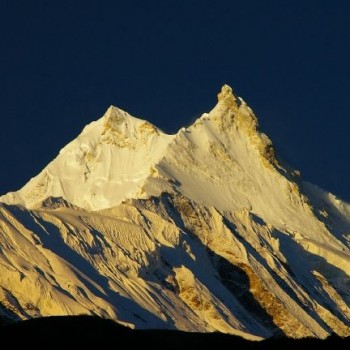Trip Details
- Destination: Nepal
- Trip Difficulty: Moderate
- Trip Style: Trekking
- Transport: Public Vehicle
- Food: Breakfast, Lunch & Dinner
- Accommodation: Teahouse or Lodge
- Group Size: 2 - 16
- Max Elevation: Larkya La Pass (5106m)
Highlights
- A scenic drive from Kathmandu to Arughat to Soti Khola.
- Explore Budhi Gandaki Valley.
- Cross Larkya La pass
- Gtreat expereance of manaslu base camp & glacier
- Explore the culture of Tibetan Buddhism in this region.
- Mesmerizing views of the Annapurna Range and Mt. Manaslu.
- Walk in the serenity of the Manaslu region.
- Visit Kargyu-Pemba Chholing Gompa, Labrang Gompa, Pungyen Nunnery etc
Description
Manaslu Base Camp Trek is one of the best off-the-beaten-path treks in Nepal. The peace and solitude in this trek are unlike any other destination in Nepal. The scenic views of Manaslu and other mountains including the Annapurna range are wonderful in the Manaslu Circuit Trek.
The Manaslu Base Camp Trek lies above the foothills of the Gorkha District. You will encounter people of various ethnicities like Brahmins, Chhetris in the lower regions. But as you trek to the high altitude regions, you will meet Gurung people. The Gurungs of this region are adherents of Tibetan Buddhism.
You can see the influences of Tibetan Buddhism in various places along this trek. During your trek, you will get to various monasteries like Kargyu-Pemba Chholing Gompa, Labrang (Lama’s Place) Gompa, Pungyen Nunnery, etc. These monasteries let you explore the Buddhism of this region. These monasteries are also set beautifully amidst the mountains surrounding this region.
Manaslu Base Camp Trek by Mount Mania starts after a scenic drive through the hills surrounding Kathmandu valley to Arughat and finally to Soti Khola. The trekking trails then take you along the gushing waters of Budhi Gandaki river.
The trail passes through several farmlands, bamboo, rhododendron, oak, and pine forests as you trek to the highest point of this trek in Larkya La pass. This pass is set at an altitude of 5125 meters. The pass is one of the best vantage points to view several mountains like Pawar Peak (6,620m/21,720ft), Cheo Himal (6,820m/22,376ft), the Himlung pyramid (7,126m/23,380ft), Gyaji Kung (7,030m23,065ft), Kang Garu (6,981m/22,905ft) plus Annapurna II (7,937m/26,041ft).
12 Days Manaslu Base Camp Trek Itinerary
Hide AllDay 1: Drive from Kathmandu to Soti Khola
Today, you will head out to the starting point of your trek i.e. Solti Khola. You will take a bus from Kathmandu to Soti Khola. The route of the bus takes you along the Prithvi Highway. The road you through the middle hills till Malekhu. From Malekhu, a 30km road takes you north along the Trishuli river as you head towards Dhading Besi. A further 35-kilometer drive along a dirt road leads you to Arughat. As the road gets winding up to Gola Bhanjyang, you can see panoramic views Ganesh, Baudha and Manaslu Himal. A further 3 hours of ride leads you to Soti Khola. The bus ride up to Soti Khola is 8-9 hours.
Day 2: Trek from Soti Khola to Maccha Khola
You will start your trekking journey today. The initial portion of today’s trek takes you along a gradual uphill through beautiful Sal forests. You will then walk past forested and terraced ridges and numerous waterfalls along the way. At times, the trail also narrows. You might also find yourself clinging to the sides of cliffs sometimes.
The trail then descends as you walk past rice paddies before climbing up to Labubesi (885m/2,800ft). From the village of Labubesi, you will trek to a suspension bridge Nauli Khola falls. You will then descend to gravel banks along the river before hiking gently up to Machha Khola village(900 meters). The trek from Soti Khola to Machha Khola is 6-7 hours long.
Day 3: Trek from Maccha Khola to Jagat
After breakfast, you will head out on a 6-7 hour trekking journey to Jagat (1410 meters). After crossing Machha Khola, you will trek gently up to the tiny village of Khorla Bensi. From there, you will get to the natural hot springs at Tatopani. This trail is also quite challenging.
After crossing a short forested path, you will reach a single teahouse at Doban. Above the village of Dobhan, Budhi Gandaki river descends rather impressively to a series of rapids. The river is quite calm beyond this steep slope. A further trek from Dobhan leads you to Lauri, where you will cross the river on a suspension bridge. Finally, you will climb on a high path to the fields of Jagat, where you will spend your night.
Day 4: Trek from Jagat to Deng
After breakfast at a teahouse in Jagat, you will embark on your trekking journey. A gentle uphill trek followed by a trek along level fields takes you to a suspension bridge over Budhi Gandaki. After crossing this suspension bridge, you will get to Philim. Philim is a large Gurung village that is home to small serene monasteries, stupas and prayer flags. You will have your lunch in Philim.
After lunch, you will trek through a flat leveled path. This path is inside pine and rhododendron forests. During the trek, you will also cross a few bridges that overlook quaint villages afar. After trekking for 6-7 hours from Jagat, you will arrive at Deng (1080 meters). Deng is home to a few houses. You can also enjoy an amazing waterfall lying at a small distance from Deng. This is an agricultural village that is famous for its potatoes, and buckwheat, barley, wheat, cabbage, & spinach.
Day 5: Trek from Deng to Namrung
Deng is a village that is the point of entry to Kutang or lower Nupri (part of Tibet until the 1840s): It is a primarily a Gurung settlement with the culture of Tibetan Buddhism. They have their own language. The trail from Deng takes you along a winding path to Rana. After trekking past a series of uphills and downhills, you will get to a log bridge. After crossing a tributary from the bridge, you will get to an isolated water mill. Then you will descend gently along the trail to Bihi Phedi, which lies high above the river.
Beyond Bihi Phedi, the trail descends as you cross the Serang Khola. Then, you will trek along a winding path that shapes up like an S. The path lies between sheer basalt walls. You can also see huge rocky crags to the right. You will also have splendid views of the waterfall above the maize and wheat fields. As you trek towards the northeast direction, the valley broadens. After trekking past a bridge and mani stone walls, you will reach the attractive village of Ghap (2,250m/ 7,382ft). Past the village of Ghap, you will trek through bamboo, rhododendron and oak forests. On some days, you can also see birds like Impeyan pheasant (also known as Himalayan Monal)
This trail is above the steep descent of the river. For a short duration of time, you will trek to the north bank. Then you will head back towards the southern bank after crossing a bridge. After trekking for one hour from the bridge, you will reach Namrung. Namrung also has a police checkpoint for permits. Just before you get to Namrung, the trail overlooks Tum Khola from Tibet. This adds to the volume of water in Budhi Gandaki in the confluence. The trek from Deng to Namrung (2630 meters) is 6-7 hours long.
Day 6: Trek from Namrung to Samagaon
Namrung is a Tibetan village and serves as an entrance to Upper Nupri. As you trek past a mix of forest and barley fields, you will reach Lihi. You can see impressive chortens as well as great views of Himal Chuli (7,893m/25,897ft) and Ganesh Himal. The trail then descends before entering a valley as you cross the Hinang Khola. After crossing Hinanag river on a bridge, you will trek along a steep uphill to a chorten, which offers spectacular views of Ngadi Chuli (7,873m/25,831ft).
As you trek further up a steep ridge, you will reach Lho. You can also visit a large monastery called Ribung monastery in Lho. You will then trek down a steep uphill before you reach Damonan Khola tributary. After trekking past a plateau, you will get to Shyala village (3,520m/11,549ft). Shayala overlooks many beautiful peaks like Himal Chuli (7,893m/25,897ft), Peak 29 (Ngadi Chuli, 7,873m/25,831ft); and Manaslu (8,156m/26,760ft).
As you continue trekking, you will get to a bridge over Numla Khola. The trail then takes the left of Pungyen Gompa. After trekking for 6-7 hours from Namrung, you will get to Samagaon (3530 meters). Kargyu Chholing Monastery stands against a forested moraine around the edge of this village. From Samagaon, you can only see the upper sections of Manaslu and the Naike ridge.
Day 7: Trek from Samagaon to Manaslu Base Camp. Then Back to Samagaon
Today, you will explore the village of Samagaon, which is the regional center of Nupri. You will also get to know about the culture and architecture in the region: only potatoes and barley flourish in the short summers at this altitude. Most of the people in this village weave clothes from sheep or Tibetan imported wool. They are also involved in the manufacture of hooked rugs for trade with Tibet.
You will visit the Labrang (Lama’s Place) Gompa and the Kargyu Chholing Monastery in Samagaon, The history of these monasteries dates back some 500 years ago. Many people ascribe the history of these monasteries to its earlier Tibetan settlers. The monastery has impressive wooden carvings. All in all, there are eight temple buildings. The largest of them is the Pemba Chholing Gompa. It is home to an impressive statue of Guru Rinpoche.
A gentle hike past the monastery leads you to Birendra Tal (3,450m/11,319ft). This lake lies below Manaslu Glacier. You can also trek for close to 3 kilometers to get to a hilltop or a stony beach which offers wonderful views of Manaslu. You can also follow a trail towards Samdo to a bridge over the stream from the lake. After trekking for 5-6 hours, you will get to Manaslu Base Camp.
Day 8: Trek from Samagaon to Samdo
The initial part of today’s trek descends towards Budhi Gandaki. The trail is in the north towards the lake. You will walk along the Base Camp trail as you encounter several mani walls as the valley widens. The trek is relatively easy and lies a shelf above the river. You will walk past the forests of juniper and birch which surround Kermo Kharka. The trail then descends to a wooden bridge as you cross the Budhi Gandaki river.
Then you will trek along a steep uphill to a ridge that lies above the confluence of Budhi Gandaki and Mayol Khola. You will encounter a stone arch, and fields before you get to the entrance of the village. Although the place is an attractive one, it is primarily a yak and goat herding area. The village only turned out as a settlement in the late 1950s when Tibetans fled Tibet.
As you trek past these fields, you will get to several sets of flags on a high ridge. Here, you can catch superb panoramic views of Samdo Peak (6,335m/20,785ft) and its glacial basin, the Sama Valley, Manaslu range, Syacha Glacier, Dharamsala, and Larkya La pass. After trekking for 4-5 hours from Samagaon, you will reach Samdo (3860 meters). Samdo is the last village before Gho, in the Manang District. Only informal kharkas (with lodges) lie between these villages.
Day 9: Trek from Samdo to Dharamsala
You will trek past the fields in the northern village as you cross the Budhi Gandaki the final time. This will take place in the Larkya Bazaar site. The flow of the river takes it to the Pana Danda Valley in the north. You will then take the westward trail. You will trek past grassy slopes with scrub juniper, rhododendron and lichen covered granite. This trail is just above the Syacha Khola Valley. Along the way, you can also see the origin of Syacha Glacier, which descends from the Manaslu North ridge.
The trail works heads towards the Larkya Glacier. After trekking past the Larkya La Phedi, you will get to a settlement called Dharamsala (4460 meters). Today’s trek from Samdo to Dharamsala is 4-5 hours long. A short walk from your guesthouse will take to a place with better views of the Larke (6,249m/20,503ft) and Naike (6,291m/20,641ft) peaks.
Day 10: Trek to Bhimthang via Larkya La Pass
Today you trek for 3-5 hours to ascend 800m/2,600ft to get to Larkya La Pass (5160 meters). You will then descend for 3-4 hours losing 1,500m/4,900 in altitude to get to Bimthang(3720 meters). If the wind blows, it can get really cold along the way. You have to be extra careful if you encounter ice and snow along the way.
The trekking trail from Dharamsala takes you along a gentle ascent to a ridge. Then will be a long gentle climb to the moraine. The trail along the northern moraine of the Larke Glacier is not quite steep. However, the trek is quite long and rocky. So you might find this a bit challenging. From the glacier, you can see the Larke Peak (Larke Himal) and Pawar Peak (Cheo Himal) on the south and north of the glacier respectively.
From the pass, you will trek uphill to an ablation valley. The trail then drops down to the first of four small scattered frozen lakes. As you trek uphill to the glacial moraine from the left, you will get to the first set of summit flags. The trail overlooks the Tibetan border ranges beyond Samdo Peak on the eastern side. There is a long moraine-ridge that is parallel to the Larke wall. A set of flags separates the Larke Wall. These flags are the markers of the border between the Manaslu and Annapurna Conservation areas.
This place is a wonderful point to see the various peaks like Pawar Peak (6,620m/21,720ft), Cheo Himal (6,820m/22,376ft), the Himlung pyramid (7,126m/23,380ft), Gyaji Kung (7,030m23,065ft), Kang Garu (6,981m/22,905ft) plus Annapurna II (7,937m/26,041ft).
After spending some time in Larkya La pass, you will start your descent begins from these prayer flags. The trail descends steeply from the moraine. Then you will get to a set of steep zigzags until you reach Dangboche Kharka (4,450m/14,600ft). The trail from Dangboche Kharka is not really steep. The trail winds along the lateral moraine of the Salpudanda/Bimthang glacier before getting to Bimthang Valley.
Day 11: Trek from Bhimthang to Dharapani
Bhimthang is a beautiful settlement that gives you views of the Kechakyu Himal on the north and Manaslu’s northeast face. Bhimthang serves as a settlement of the people of Samdo village in the summer season. It was also an important trading post before the border to Tibet closed down. It was also a center of the Tibetan Khampa warriors around 1970.
Today’s trek begins as you walk past the Bimthang Plain. You will descend along a trail to cross the stony glacier before heading up a moraine to enter rhododendron and pine forest. All along this route, you will get wonderful views of Larke, Manaslu, Nadi and Chuli Himals. As you descend further, you will get to Hompuk and Sangura Kharka before reaching Karche. From Karche, you will trek past terraced fields and a steep uphill until you reach Gho.
The trail from Gho takes you through farmlands to Tilje (2,300m/7,546ft). From there, you will descend rapidly towards the Marsyangdi Valley in Thonje (1,965m/6,447ft) You will then join the new road along the main Annapurna Circuit route in Dharapani(3560 meters). Today’s trek is 5-6 hours long.
Day 12: Drive from Dharapani to Kathmandu or Pokhara
Today, you will head back to Kathmandu. You will follow the Prithvi Highway en route to Kathmandu. To reach our destination, we need to drive for about 7-8 hours by jeep and 9-10 hours by local bus. On the way, you can view natural waterfalls, rice-field, local house, forest, and streams.
What to Expect
Cost Includes
- Airport Pickup and Drop
- Teahouse accommodation during the trek
- Three meals a day (11 Breakfast, 12 Lunch, and 11 Dinner) during the trek
- Local Bus Ticket (Kathmandu to Soti Khola)
- Local Bus Ticket (Dharapani to Kathmandu)
- English Speaking Trekking Guide with Insurance, Transportation, Food and Accommodation
- All Trekking Permits (ACAP, MCAP and Manaslu Special Permit)
- Daily seasonal fresh fruits after dinner
- A first aid kit carried by the guide (Oximeter to measure your oxygen and pulse in high altitude)
- All Government and Local taxes
Cost Excludes
- International Flight Ticket and Nepalese Visa Fee
- Hotel & Meals in Kathmandu
- Extra night accommodation in case of early arrival, late departure, and early return from the trek (due to any reason) than the scheduled itinerary
- Personal expenses (WiFi, Phone calls, Laundry, Bar bills, Battery Recharge, Water, Shower, and Tea / Coffee)
- Other costs not mentioned in 'Cost Includes' section
- Travel and Rescue Insurance
- Tips for Guides, Porters, and Drivers
Optional
- Private jeep Kathmandu to Soti khola USD220$
- Private jeep Dharapani to Kathmandu to USD250$
- Kathmandu Hotel Per Night Twin Sharing On BB USD 60$
PRICES & DATES
| Trip Dates | Availability | Price | |
|---|---|---|---|
| 04 Jul, 2124 - 15 Jul, 2124 | 3 space leftGuaranteed | US$750 |
Useful Information
Manaslu Base Camp Trek Difficulty
The total length of the Manaslu Base Camp trek is around 177 kilometers. You will be trekking for 10 days covering a distance of 15-20 kilometers every day.
Another factor that determines the difficulty of this trek is the uphills and downhills you will encounter along the way. Many times as you trek along the Budhi Gandaki river, the trek can be harrowingly steep. The trek up to Larkya La Pass is also quite challenging.
Guide on Manalsu Circuit Trek Difficulty
Manaslu Base Camp Trek takes you to the highest altitude of 5,213 meters in Larkya La Pass. The altitude is high enough to incite altitude sickness. The trails also can get quite breezy making the trails quite cold.
Taking all of these things into consideration, the Manaslu Base Camp Trek is a strenuous trek. As a result, you will have to be quite fit in order to complete this trek. 2-3 months of physical preparation will be necessary for you to complete this trek.
Manaslu Base Camp Trek Best Time
Autumn (September, October, and November) is the most popular time for the Manaslu Circuit Trek. Autumn offers the most beautiful views of Manaslu as well as other mountains in the Annapurna Range.
Spring (March, April, and May) is the second most popular time for the Manaslu Circuit Trek. The rhododendron forests of the Manaslu Conservation Area light up beautifully in this season. The low rainfall in this season is another reason for the popularity of the spring season.
As you will trek to an altitude of more than 5000 meters in the Manaslu Circuit Trek, the trek can be quite cold in the winters (December, January, and February) with temperatures going as low as -20 degrees C. In the summer season (June, July, and August), the trails can be quite wet with the monsoon. So you will have to pack and prepare extremely well to trek in these two seasons.
Also Read: Updated Manaslu Trek Permit Cost
FAQs
Can I get a visa on arrival in Nepal?
Yes, most nationalities can obtain a Tourist Visa upon arrival at Tribhuvan International Airport (TIA) in Kathmandu. You can fill out the form online before arrival or use the kiosks at the airport. Be sure to have USD cash for the visa fee ($30, $50, or $125 depending on the duration).
Do I need to book in advance?
For the Manaslu Circuit, advanced booking (at least 2–4 weeks prior) is highly recommended. Because this is a restricted area, we need time to process your special permits, which require your passport copies, visa page copy and photos once you arrive in Kathmandu.
How do you transfer me from Tribhuvan International Airport to my hotel?
Our representative will meet you outside the arrivals gate holding a sign with our Company Logo. From there, you'll be driven via private vehicle directly to your hotel in Thamel or the surrounding area, ensuring a smooth start to your journey.
Can I do the Manaslu Circuit without a guide?
No. The Government of Nepal classifies Manaslu as a restricted area. It is mandatory to have a licensed trekking guide and a minimum of two trekkers in a group to obtain the necessary permits.
Can your guide speak English?
Absolutely. All our guides are fluent in English and are trained to explain the culture, geography, and safety protocols clearly throughout the journey.
How experienced is your guide? How well do they know the Manaslu region?
Our guides have years of experience specifically in the Manaslu region. They are certified by the Nepal Government and have completed high-altitude medical training to ensure your safety and an enriched cultural experience.
Do I have to issue my own permit for the Manaslu Circuit Trek?
No. As an individual, you cannot apply for these permits yourself. Only registered Nepalese trekking agencies can apply for the Manaslu Restricted Area Permit (RAP) on your behalf.
What documents do you need for the permits?
We require a clear scan of your passport (valid for at least six months) and a copy of your Nepal visa (once you arrive in Kathmandu)
What permits do I need for the Manaslu Circuit Trek?
You need three main permits:
Manaslu Restricted Area Permit (RAP)
Manaslu Conservation Area Project (MCAP)
Annapurna Conservation Area Project (ACAP)
Chumnubri Rural Municipality Fee
Mount Mania as a registered trekking agency in Kathmandu, we will apply all of these four permits.
Why do I need an ACAP Permit for the Manaslu Trek?
The Manaslu Circuit trail officially ends in Dharapani, which falls within the Annapurna Conservation Area. Therefore, an ACAP permit is required to legally exit the region through the Besisahar route.
What is covered in the amount I pay for the trek?
Typically, our packages include all necessary trekking permits, ground transportation from starting to end of the trip, an English-speaking trekking guide, strong porters, mountain teahouse accommodation during the trek, and three meals a day with one tea / coffee a day.
How much money do you recommend to take on the trek?
We suggest carrying $300–$500 (in Nepalese Rupees) for personal expenses such as Wi-Fi, hot showers, charging electronic devices, bottled drinks, and tips for the staff.
What are the extra costs of the trek?
Extra costs include your international flights, Nepal visa fee, travel insurance (mandatory), tips, and personal trekking gear. On the trail, extra costs include snacks, soda/alcohol, and hot showers.
How much does it cost to trek the Manaslu Circuit?
Prices vary based on group size and service level, but a standard 14–18 day trek generally ranges between $1,200 and $1,800 USD.
How far is Manaslu from Kathmandu?
The drive from Kathmandu to the starting point (Soti Khola or Machha Khola) is approximately 140–160 km. However, due to mountain terrain, the drive takes 7 to 9 hours.
How high will I go on the Manaslu Trek?
The highest point is the Larkya La Pass, standing at an elevation of 5,106 meters (16,752 ft).
When is the best time to trek in Manaslu?
The best windows are Spring (March to May) for rhododendron blooms and stable weather, and Autumn (September to November) for the clearest mountain views and crisp skies.
Where is Manaslu?
Manaslu is located in the Gorkha District of Nepal, about 64 km east of Annapurna. It is the 8th highest mountain in the world.
How cold is it at Manaslu?
Temperatures vary by altitude. In the lower regions, it's pleasant (15°C to 20°C). However, above 4,000m, nighttime temperatures can drop to -10°C or -15°C, especially during late autumn and early spring.
What kind of food is available?
Tea houses serve a variety of meals including the traditional Dal Bhat (lentils and rice), pasta, noodles, potatoes, eggs, and pancakes. Vegetarian and vegan options are widely available. Read this Manaslu Food Guide
What kind of accommodation is available?
Accommodation consists of local tea houses (mountain lodges). Rooms are usually twin-sharing with basic wooden beds and blankets. They offer a cozy atmosphere and a warm communal dining hall.
I want a single room. What should I do?
We can arrange a single room in Kathmandu and at lower elevations. However, in higher altitudes (like Dharmasala), rooms are limited and sharing may be necessary during peak season.
Is it possible to have a shower on the trek?
Yes, most tea houses offer hot showers for a small additional fee (approx. $3–$5). As you get higher, showers may be "bucket showers" with heated water.
What is the ideal weight for my backpack?
If you are carrying your own gear, aim for 10–12kg. If you have a porter, your daypack should only weigh 4–5kg to carry your water, camera, and essential layers.
What is the weight limit for the porter?
A porter typically carries up to 20–25kg, usually shared between two trekkers (roughly 12kg per person).
Should I be worried about Altitude Sickness?
Altitude Sickness (AMS) is a risk on any trek above 3,000m. We design our itineraries with proper acclimatization days in Samagaun and Samdo to minimize risk. Our guides are trained to monitor your health daily.
How long is the Manaslu Circuit?
The total trekking distance is approximately 177 kilometers (110 miles), usually covered over 12 to 14 days of walking depending on the specific itinerary.

Jastin
United KingdomAmazing Manaslu Trek with Mount Mania
Amazing trek experience
It was amazing trek which i did in Nepal with Mount Mania Treks it was wonderful memories thy provide best service during the manaslu circiut trek, guide & porter was great he was experienced he share lots of intresting history about culture & life style in Nepal. Compay owner also very gentleman he provide all information about out trip definitely i like to come again with Mount Mania Treks !!!

